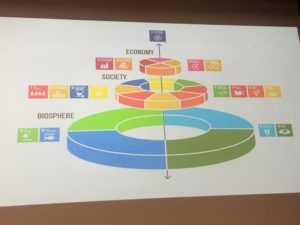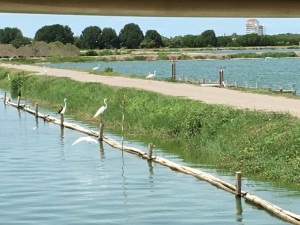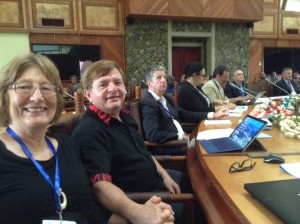Me mihi rā ki a Ranginui, ki a Papatuanuku Ki Te Ao Katoa e tü mai nei. E mihi ana ki te whenua E tangi ana ki te tangata Ki ngā tāngata katoa e noho nei. We acknowledge Ranginui and Papatuanuku We acknowledge the universe. We greet the land And call the people All peoples who live here.
Purpose 
Response works with responsibility for public good in governance, sustainability, education and law. The Treaty of Waitangi and partnership with Māori are priorities. Response is a lead partner in the UNU Waikato Centre of Expertise in Education for Sustainability (RCE Waikato).
In Aotearoa-New Zealand and the Pacific region Response supports projects on sustainability, with collaboration across environmental, economic and social sectors. In keeping with our context in the Pacific ‘Water Continent’ RESPONSE gives particular attention to issues on water and climate.
RESPONSE is a member of the International Alliance for Responsible and Sustainable Societies, associated with the Charles Leopold Mayer Founda tion, France. In 2015 Betsan Martin became Executive Chair, and Yolanda Ziaka, Greece, Executive Vice-Chair.
tion, France. In 2015 Betsan Martin became Executive Chair, and Yolanda Ziaka, Greece, Executive Vice-Chair.
See Alliance-respons for website and data base of resource materials, and brochure Alliance brochure for the Alliance in English, French and Spanish. <www.alliance-respons.net>
Ka Māpuna

Towards a Rangatiratanga Framework for the Governance of Waterways
Betsan Martin, New Zealand Māori Council, with Linda Te Aho
Ka Māpuna 15July21
Natural and Build Environments Exposure Draft July 2021
The Natural and Built Environment bill will replace the RMA.
Alongside resource management reform, the Three Waters (drinking, waste, stormwater) are being taken out of regional councils, under Taumata Arowai.
While the focus may appear to be on water quality, the heart of the issue is governance and rangatiratanga. An important reference for resource legislation is the Stage 1 and 2 Waitangi Tribunal Freshwater & Geothermal recommendations.
The current proposals:
- Overall direction is development within environmental limits
- The new legislation (NBE Act) proposes more national direction through a National Planning Framework. Regional Planning (14 Committees) provide amalgamated planning and more powers for Minister to set limits nationally. Plans for environmental limits etc are to replace consents as means to achieve limits for water quality
Opportunities, Limits, Questions re Exposure Draft
- Recognition of rangatiratanga – is insufficient
- Addressing housing crisis by making land available – will state land be used for private wealth
- Climate Change – will there be criteria-based resource use for a zero carbon pathway?
Exposure draft Natural Built Environments 12July21
COVID. Letter to Prime Minister for Just Recovery 9 April.
A remarkable opportunity to rebuild an economy for the climate and for people
Collaboration for Climate Education 2019-2020. See oClimate Learning page

NGO’s Generation Zero, Climate Challenge, Papataiao, Response and VUW academics meet to link formal and informal initiatives on climate education.
Just Transitions and Climate Change (Zero Carbon) Act 2019

The purpose of the Act is to provide for clear and stable climate change policies up to 2050 to limit global warming to 1.5 degrees. The Green House Gas reductions are to be achieved through a sustainable climate-resilient economy and a just and inclusive society.
A Climate Change Commission will set budgets and targets, and f goals for long lived gases and methane and nitrogen. Adaptation is included. . The Treaty of Waitangi is included to taking account of Māori and iwi.
Effects on Māori, working people, regions needed a commitment to climate transitions accountabilities across all sectors. For notes on the ZCA see ‘Resources’
Circular, Regenerative economy – Kate Raworth (2019) Doughnut Economics – 7 ways to think like a 21st Century economist – Presentation at Just Transitions – demonstrating a regenerative economy
Circular economy:wellbeing of people within biophysical capacity
Maori economy

Recent Publication! 2019
Law and Governance for Living Well with the Earth
Order from Taylor and Francis, Routledge
RCE Waikato Aotearoa NZ Regional Centre of Excellence in Education for Sustainability
 RESPONSE Trust is the lead partner in this Regional Centre. Currently the main project is on Climate Change Education.
RESPONSE Trust is the lead partner in this Regional Centre. Currently the main project is on Climate Change Education.
Values in Education Symposium International Islamic University Kuala Lumpur Nov. 2018.
RCE partnerships with global citizenship education:





Aboriginal fire lighting at Asia Pacific RCE meeting Western Sydney, Sept 2018




Responsibility grows in importance as freedom discovers itself to be unjust. Emmanuel Levinas
UPDATES
Otaki Youth Social Justice Summer Camp – engaging with the history of neo liberalism in New Zealand, Māori and climate change and on hegemonic masculinity!



Pacific Indigenous Conference Review by Betsan Martin
A Wedding Cake -a ‘Rockström and the SDG’s
In April Johan Rockström for the Swedish Resilience Institute visited NZ and brought new thinking from ‘planetary boundaries’ to sustainable development goals. Let’s speak of a Wedding Cake with land and forests, water and oceans, biodiversity and atmosphere as the base for the SDG’s. SDG’s and Planet Boundaries May18 the SDG Conference in Wellington, NZ

Investing for People and the Planet
A NZ discussion policy leads to New Responsible Investment April18 with fiduciary duty to future generations and stakeholder , rather than shareholder interests. Photo at a Ministry for Environment briefing on Climate Investment.

Treaty for the Environment Treaty Draft Global-pact-for-the-environment
A draft of a “Global Pact for the Environment” – is to be a basis for a new UN treaty to define fundamental environmental rights.
It was launched at a high-level event in Paris, with the backing of French President Emmanuel Macron, former UN Secretary-General Ban Ki-moon and IUCN President Zhang Xinsheng.
The Pact synthesises fundamental and common principles of environmental law. It sets out principles which compel States and other legal persons to protect the environment, promote sustainable development and intergenerational equity, and ensure the right of access to information and environmental justice.
Fiji Partnership Meeting
2017 is the year to refresh attention to importance of Fiji and the Pacific Islands for COP23. Earlier in July Betsan Martin went to a Climate Change action partnership meeting in Fiji – it was Marrakesh Partnership meeting – this is a direct initiative from COP22, with bringing non-State actors into higher profile for the climate commitments.
Fiji and Pacific Islands leaders are bringing global attention to Pacific Peoples, and to Oceans. PSIDS Statement Suva 5 July
Climate Chance is an annual summit for the mobilization of non-state actors to contribute to the Climate COPs with global agenda for action on climate responsability. See ‘Resources’ page for synthesis of the 2016 Summit in Nantes France.
Climate: Is there a Place for Churches?
For video presentations at Climate for Churches, August 2016 with Professor James Renwick, Climate Science; Dr Adrian Macey, Climate Policy, Su’a William Sio, PM Mangere, Koreti Tiumalu, Pacific 350.Org, and Panel Discussion led by Rod Oram, Business journalist.
Auckland New Zealand – watershed adaptation, Sirindhorn Environmental Park and the Petchaburi Watershed , and workshop.
watershed adaptation, Sirindhorn Environmental Park and the Petchaburi Watershed , and workshop.

Ahmedabad Conference: Education as a Driver for SDG’s.
The Conference linked to the education theme in the Paris Agreement of COP21. Representatives of the UNU Regional Centres of Expertise (RCE) contributed to the SDG themes, and shared leading initiatives in the field of education. See the Ahmedabad Plan of Action and ESDG Recommendations.
Betsan was in the climate group, and gave a presentation on education for climate Responsibility .
COP21 – Several Alliance for Responsible and Sustainable Societies members attended COP21.
We worked on a draft text for a Declaration of Interdependence and Responsibility 24 Nov2015.







COP 21 is pivotal for creating a platform for global co-operation on climate. Affirming the target of 2 degrees, ‘and pursuing efforts to limit the temperature increase to 1.5 degrees’, is key to keeping stronger ambition in view. Let us congratulate Small Island Developing States for their remarkable concerted strategy to keep the Parties vigilant about a stronger ambition of 1.5 degrees.
A science panel on the cryosphere brought home the compelling prospect of crossing irreversible thresholds. The cryosphere includes all the regions of ice, which are key to the stability of the climate system, and directly linked to sea levels and the impacts of altered thermodynamics and hydrological systems.
As a case in point, when permafrost melts, CO2 and methane are released into the atmosphere. A 2 degree rise would release 50 Gt of Carbon, out of a total global carbon budget of 275 Gt. COP21 Pivotal Alliance 21Dec15
A Review of commitments for COP21 in a framework of responsible climate targets with feasible transition pathways is based on research commissioned by Dr Kennedy Graham, PM, Green Party new Zealand. See Responsible Feasible Climate Ambition
Alliance Meetings December 2015
In Paris, Alliance members held parallel meetings to make plans for governance of the Alliance and make strategic plans. We are proposing the Alliance becomes a Resource Centre for Interdependent, Responsible and Sustainable Societies. A discussion document ‘Governance Alliance Assemb 20Dec15 has been circulated to Alliance members.
A video, ‘Lima to Paris‘ introduces a Manifesto for COP21
IUCN Oceania meeting in Fiji, July 2015
ECO and Response brought forward the need to include and elaborate responsibility and public good alongside rights as an ethical reference for IUCN plans and programmes. A brief paper on Responsibility and public good was circulated at this meeting for reviewing the 2017-2020 IUCN global and Oceania programmes



Seminars at the Collége de France International Law Faculty 9-12 July included presentation of proposals for the COP21 Climate Negotiations in December, and in-depth discussions on Law, Responsibility and Climate. These will be posted soon. here are some photos.




Trans Pacific Partnership – the Investor States Disputes provisions allow for corporate law suits against governments which regulate for health and environmental benefits. A provision for a staged introduction of reduction of carbon emissions by corporates would put such a trade agreement in line with climate commitment aspirations, and on a responsible pathway. There are no such provisions in the TPP. Read more Media TPP April 2015
RCE Penang meeting with RCE Waikato representative Betsan Martin, January 2oth, to plan a Webinar and further collaboration
The World Congress on International Law, Delhi India was co-hosted by Indian Society for Internal Law and the Forum for Ethics and Responsiblity, India, and featured a stream on Responsibility
We met with the Minister of Justice Sadananda Gowda, Mr Raimesh Jairam, Member of Parliament, Dr Behar, former Chief Secretary Madya Pradesh; Dr E. Natchiappan, President of the Indian Society of International Law – and others
The opening of the Congress with the Vice President of India, outlined that the UN was intended to stop wars between states, but now we have wars within States, which are largely about disaffection with governments. A legal instrument for ending these conflicts is not known. Members of the International Court of Justice and many other eminent speakers spoke about India-Africa links and as they spoke about the many different International Laws – Law of the Sea, Maritime Law, Montreal Protocol for Substances that Deplete the Ozone Layer, European Human Rights, the Convention on long-Range Transboundary Air Pollution, Antarctic Treaty. We were all enchanted with a presentation on Global Governance of Space by Professor Ram Jakhu, at McGill. He said Space is a mess! full of debris.
Monsieur Pierre Calame led the Responsibility Stream with principles of Responsibility and the Transitions approach, Neetu Sharma spoke about Food security – an area that touches so many different fields – access, economic systems, distribution. and Dr Nahid Fadousi from Bangladesh spoke about Child Rights.
Betsan Martin’s presentation on Law, Responsibility and Climate and, used ideas from the Symposium in NZ, and outlined Public Trust as a legal pathway for climate. While we hold the ambition of an international legal agreement, we have the reality of an evolutionary process. One of the issues not so often noted is that cumulative CO2 takes the challenge to greater heights.
We agreed on the Delhi Declaration as a statement to take forward for COP21 (to be mandated before circulating).
This event overlap with UNU Regional Centre of Expertise networks – When we went to an evening reception at the French Embassy I spoke to a judge of the International Court of Justice and two members of the International Law Commission who said that a proposal for Public Trust of the Atmosphere has just been accepted by the Law Commission.
A NZ Symposium on Law, Responsibility and Governance was co hosted by RCE Waikato, Te Piringa Law Faculty and supported by the Charles Mayer Foundation, France. This international event at the Waikato Tainui College brought Māori, Pacific leaders and French contributors to seek legal pathways for climate justice and a new approach to water governance. For a review and highlights of Law and Responsibility Sails


UN Small Island Developing States Conference Samoa Sept 1-5, 2014.

Samoa Village Projects Meetings of Falelima, Matafa’a, Lalomauga Villages for PDCT project planning. July 2014
Key Messages from the Conference:
The Green/Blue economy in Small Island States puts the environment at the centre of the economy. SIDS is at the forefront of the ‘Green/Blue economy because they are natural resource economies. Small Island States are at the frontlines of climate change, with their security threatened by the impacts of climate on food security, fisheries, floods and droughts and weather disasters, ocean acidification, population migration. Digital connectivity is the way to overcome the tyranny of distance that is one of the challenges of SIDS. In Pacific world views, the oceans connect Islands. Partnerships between governments, private sector and NGO’s are vital for the management, regulation and protection of oceans and fisheries. Partnerships: Governments cannot lead development and transitions to green/blue economies alone. Business investment is need to catalyse innovation and provide expertise. Aid for sustainable development could be replaced by investment. UNANZ Presentation on the theme SIDS UNANZ Water July14 Report on Small Island Developing States comp Ph (1) Asia Pacific meeting of UNU Regional Centres of Expertise , Penang 2014  Sandy Morrison, Anthony Capon and Betsan Martin
Sandy Morrison, Anthony Capon and Betsan Martin  Open Letter on a Global Citizen Movement Johannesburg Nov. 2013. Bayo Akomolafe and Marta Benavides reflect on a Global Citizen’s Movement meeting in Johannesburg – they suggest change needs a paradigm shift in our modes of working and living. Angeline Greensill (Tainui) and Nicolas Krausz working on the ‘Compass’ for the Global citizen Movement.
Open Letter on a Global Citizen Movement Johannesburg Nov. 2013. Bayo Akomolafe and Marta Benavides reflect on a Global Citizen’s Movement meeting in Johannesburg – they suggest change needs a paradigm shift in our modes of working and living. Angeline Greensill (Tainui) and Nicolas Krausz working on the ‘Compass’ for the Global citizen Movement.  Compass for Global Citizens Movement Johannesburg Sth Africa Nov. 2013 Maria Humphries, Florencia Librizzi and Frank Scrimgeour at Kaarohirohi Conference, Hopuhopu, Hamilton.; Nov. 2013. Maaori business development and Principles of Responsible Management Education. http://cms.mngt.waikato.ac.nz/prmeconf/Home.aspx
Compass for Global Citizens Movement Johannesburg Sth Africa Nov. 2013 Maria Humphries, Florencia Librizzi and Frank Scrimgeour at Kaarohirohi Conference, Hopuhopu, Hamilton.; Nov. 2013. Maaori business development and Principles of Responsible Management Education. http://cms.mngt.waikato.ac.nz/prmeconf/Home.aspx 
October 2013. Edith Sizoo, Coordinator of Forum for Ethics and Responsibility, meets with leaders for interactive dialogue with India Rights and Responsibilities Forum. Edith’s Speech on Responsibility and a Gender Just Society
Aotearoa NZ – Maori interests in water spring up in response to government proposals to sell hydro energy assets. Click here for The Value of Water and the Price of Power
Charter for Responsibilities – Rio+20, 2012
RESPONSE and the International Forum on Ethics and Responsibility proposed a Charter of Universal Responsibilities in the agenda for Rio+20, the UN International Conference on Sustainable Development in Brazil, June 2012. See <www.ethica-respons.net>  For a review of the Rio+20 outcomes see: click here Rio does not ensure Responsibility for the planet
For a review of the Rio+20 outcomes see: click here Rio does not ensure Responsibility for the planet  Responsibility for Oceans – a proposal. click here For a rationale for a Charter for Universal Responsibilities click here. A proposed for a Charter for Universal Responsibilities click here. Call on Governments for a Charter for Universal Responsibilities click here
Responsibility for Oceans – a proposal. click here For a rationale for a Charter for Universal Responsibilities click here. A proposed for a Charter for Universal Responsibilities click here. Call on Governments for a Charter for Universal Responsibilities click here
RESPONSE
1. Regional Network For the Pacific regional programme we are drawing from our Across Oceania network. This network for Responsibility has been generated over the past eight or nine years with links with partners in small Islands states and the larger countries of the southern part of the ‘Water Continent’ including Australia, Samoa, Vanuatu, Papua New Guinea and Aotearoa-New Zealand. Current projects and resources:
- Rain Water harvesting project in Falelima Village, Samoa
- ‘Water is Life’ Overview and Research Study by Betsan Martin
- ‘The Power of Relational Responsibility’. Research Paper by Te Kawehau Hoskins, Betsan Martin and Maria Humphries.
2. Professional Network – Environment and Governance
Our document on ‘Ethics and Responsibility – Environment and Governance’ includes material from Aotearoa New Zealand, the Pacific region and reference to global issues on governance and environment. It draws on project work and research in the region. See Draft document by Betsan Martin and Te Kawehau Hoskins.














